Mastering quality control isn’t just an academic exercise; it’s a critical career skill that boosts employability by teaching you how to improve processes, reduce waste, and deliver excellence in any industry.
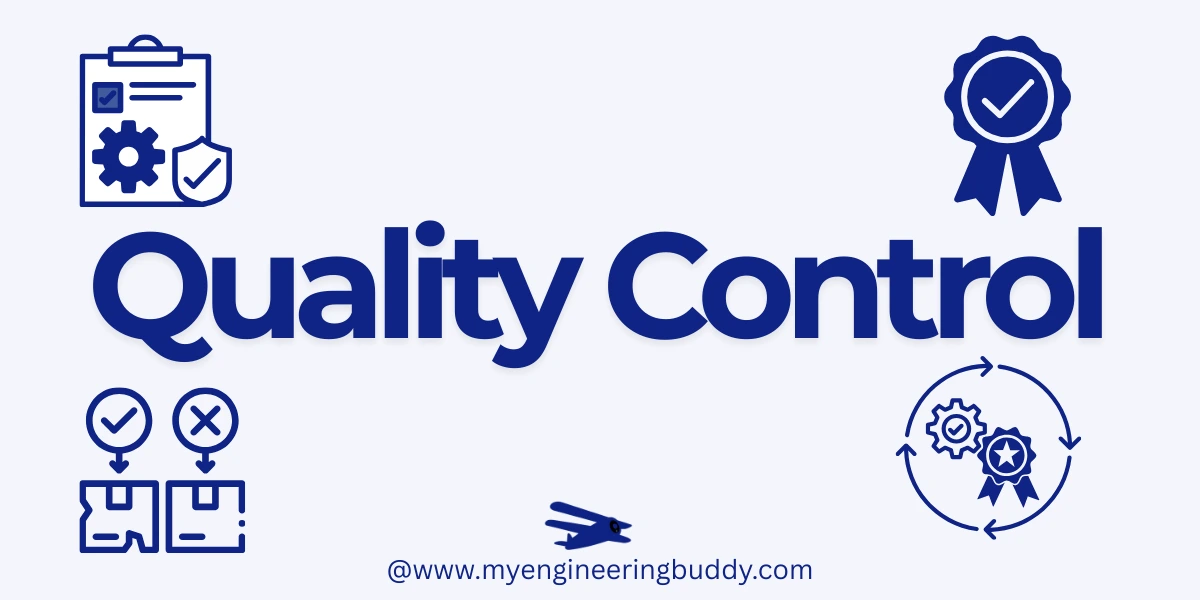
I remember my college engineering project like it was yesterday. My team and I had spent weeks building a small automated robot. We pulled all-nighters, fueled by cheap coffee and the sheer will to get it done. On presentation day, we were proud. It looked perfect. But when we switched it on, it moved two inches and then one of its wheels fell off. We had focused so much on just building it, we’d completely overlooked the quality of our assembly. We built a product, but we hadn’t built a good product.
That little wobbly robot taught me a lesson that multi-billion dollar companies learn the hard way: it’s all about quality. This principle is the very heart of a field known as Quality Control (QC), a discipline that’s not just for engineers but is crucial for anyone aspiring to a successful career in business, manufacturing, software, and beyond.
What is Quality Control, Really?
At its core, Quality Control is a process that ensures products, services, or processes meet a specific set of quality standards. Think of it as the ultimate reality check. It’s not about hoping for the best; it’s about verifying that the best was achieved. It answers the simple question: “Did we make what we intended to make, and is it good enough?”
Let’s use a simpler analogy: baking a chocolate cake for a competition.
- The Standard: The recipe says the cake must be moist, rich in flavor, and exactly 8 inches in diameter.
- Quality Assurance (QA): This is the proactive part. You choose high-quality cocoa, pre-heat the oven to the correct temperature, and mix the ingredients in the right order. You are designing a process to prevent mistakes.
- Quality Control (QC): This is the reactive part. You check the final cake. You measure its diameter, taste a small piece for moistness, and check its color. You are inspecting the output to find defects.
Many students get QA and QC confused, but the distinction is vital. A good Quality control teacher will emphasize that QA is about the process, while QC is about the product. Both are essential for success, but QC is where the final verdict is delivered.
It is easy to mix up these two concepts, but they play very different roles in the engineering lifecycle. The comparison below highlights the key differences between prevention and detection.
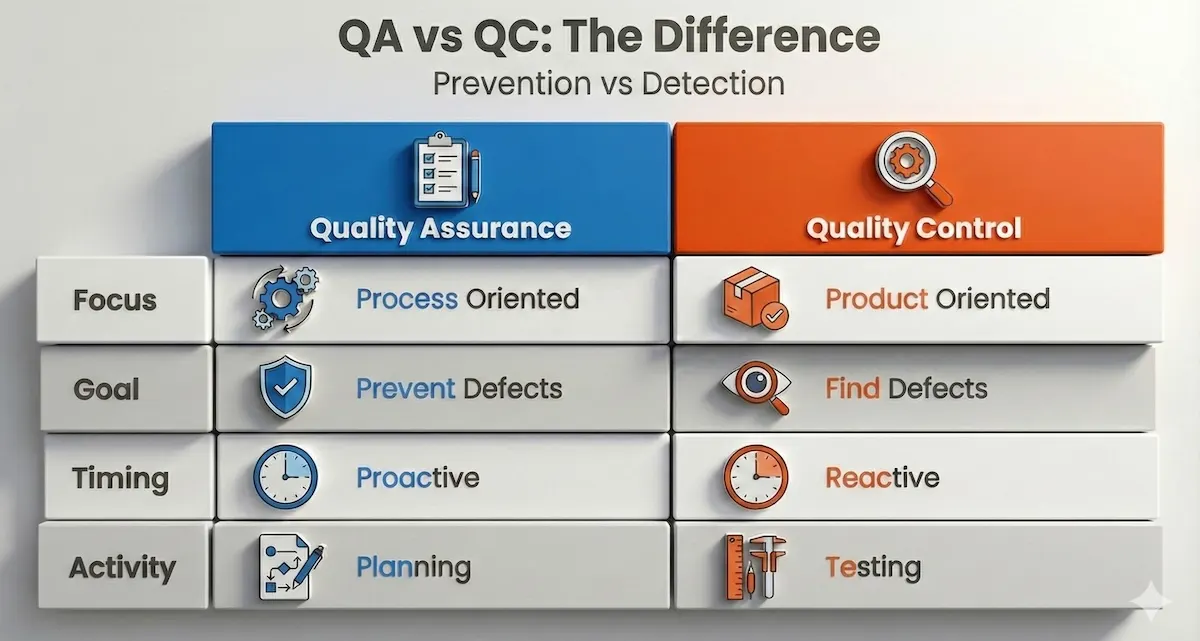
Understanding that QA prevents mistakes while QC finds them is the first step to mastering quality engineering.
By understanding this distinction, you can ensure you are applying the right mindset at the right stage of production.
Why Quality Control is a Game-Changer in Every Industry
The principles of quality control are universal. Once you start looking, you’ll see them everywhere, silently ensuring our world functions safely and efficiently. The financial impact of ignoring quality is staggering. According to the American Society for Quality (ASQ), many companies have a “cost of poor quality” that can range from 15% to as high as 40% of their total revenue. That’s money lost to defects, recalls, and unhappy customers—all things a robust QC system prevents.
Many businesses underestimate how much money is actually draining away due to errors. This ‘hidden factory’ of waste can consume a massive portion of revenue.
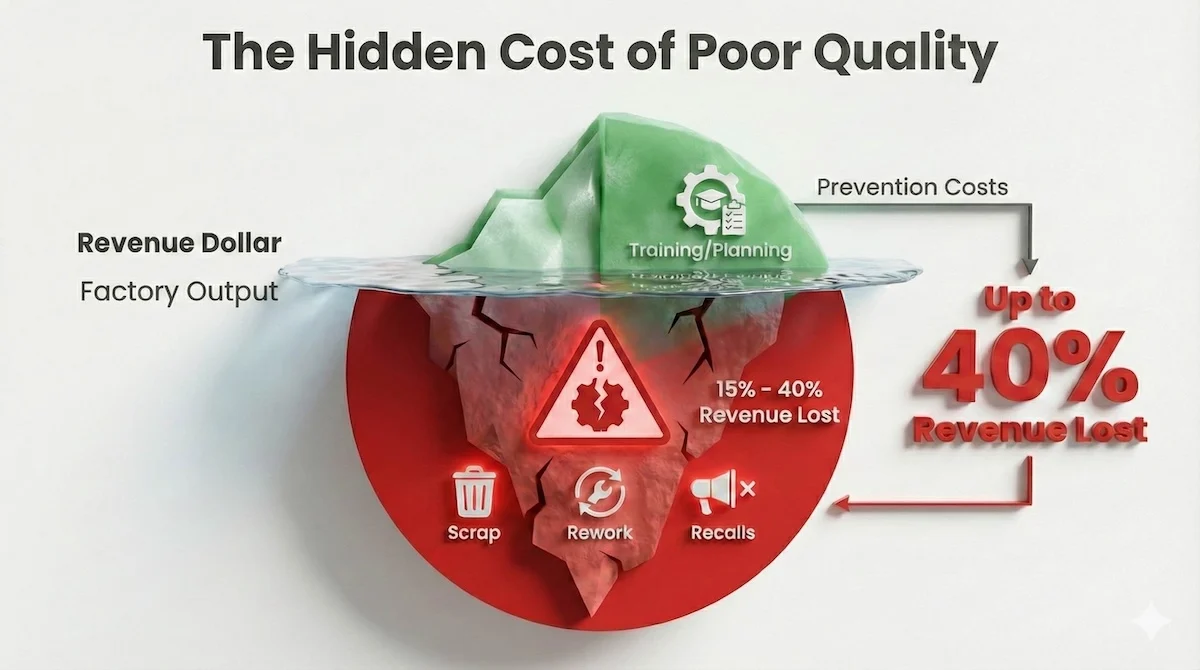
Ignoring quality control can cost companies up to 40% of their total revenue through hidden wastes like rework and recalls.
A strong Quality Control engineer helps recover this lost revenue, making them an invaluable asset to any company.
From Smartphones to Spacecraft
In manufacturing, QC is king. Every iPhone, every Toyota car, every Boeing airplane undergoes thousands of quality checks. A tiny defect in a smartphone might just be an annoyance, but a similar defect in an aircraft engine could be catastrophic. This is why the field is so rigorous and why a solid understanding gained through good Quality control teaching is so valued.
In the Digital World of Software
When you use your banking app, you trust that your money is safe. That trust is built on countless hours of QC, known in the software world as “testing.” Quality control professionals hunt for bugs and glitches that could compromise your data or cause system crashes. Without them, the digital economy would grind to a halt.
In Healthcare and Beyond
Nowhere is quality control more critical than in healthcare. From ensuring a batch of medicine has the correct dosage to verifying that a surgical instrument is sterile, QC professionals are the guardians of patient safety. The same goes for the food we eat, the water we drink, and the clothes we wear. It’s a field with a profound and direct impact on people’s lives.
Core Concepts of Quality Control Students Must Master
Studying quality control can feel like learning a new language filled with charts, statistics, and acronyms. It’s a challenging subject, and it’s completely normal to need a helping hand. Many students find that getting Quality control homework help for specific topics can make all the difference between confusion and clarity.
Statistical Process Control (SPC)
This is one of the pillars of QC. SPC uses statistical tools, most famously the “control chart,” to monitor and control a process. Imagine you’re tracking the time it takes to deliver a pizza. Some variation is normal. But what if one delivery takes three hours? SPC helps you identify if that’s a random, one-off event or a sign that your delivery process is broken.
Control charts can be intimidating at first glance, which is why personalized Quality control tutoring can be so effective in breaking down these complex statistical concepts into manageable steps.
The Seven Basic Tools of Quality
A great Quality control tutor will tell you that you can solve about 80% of all quality problems with just seven basic tools. These are:
- Cause-and-Effect (Ishikawa) Diagram: Also called a fishbone diagram, it helps brainstorm all potential causes of a problem.
- Check Sheet: A simple form for collecting data in real-time.
- Control Chart: The heart of SPC, as mentioned above.
- Histogram: A bar graph showing frequency distribution, helping you see the most common problems.
- Pareto Chart: Based on the 80/20 rule, it helps you focus on the “vital few” problems that are causing the majority of the issues.
- Scatter Diagram: Helps you visualize the relationship between two different variables.
- Stratification: A technique to separate data into different groups (e.g., by shift, by machine) to find patterns.
Memorizing these tools is essential for any aspiring quality engineer. Here is a visual guide to the toolkit you will use most often.
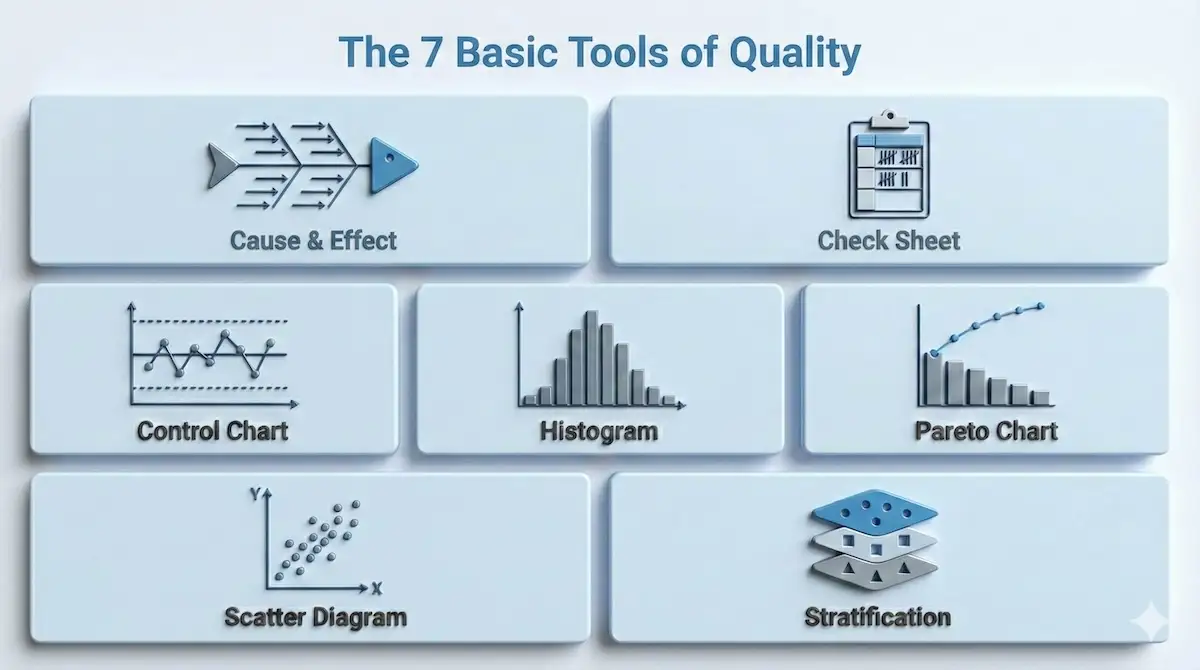
Mastering these seven visual tools allows engineers to solve nearly 80% of all quality-related problems.
Keep this visual in mind when you face a new problem; usually, one of these seven tools holds the key to the solution.
Mastering these tools is often the focus of coursework, and if you’re struggling to apply them, seeking Quality control assignment help is a smart move to stay on track.
Acceptance Sampling
You can’t test every single potato chip in a factory. It’s just not possible. Instead, companies use acceptance sampling: they take a small, random sample from a large batch and test it. If the sample is good, they “accept” the whole batch. It’s a fascinating application of probability that saves companies millions, but the calculations can be tricky. It’s another area where dedicated Quality control hw help can clarify the methods and formulas.
The Modern Evolution of Quality Control: Six Sigma and Lean
In the competitive markets of the USA, UK, and the Gulf, companies are always pushing for better. This has led to the development of advanced quality methodologies like Lean and Six Sigma. Lean focuses on maximizing customer value while minimizing waste. Six Sigma is a data-driven approach to eliminate defects, aiming for near-perfection (3.4 defects per million opportunities).
While often used together, these two methodologies have distinct targets. Let’s look at how they differ in their approach to improvement.
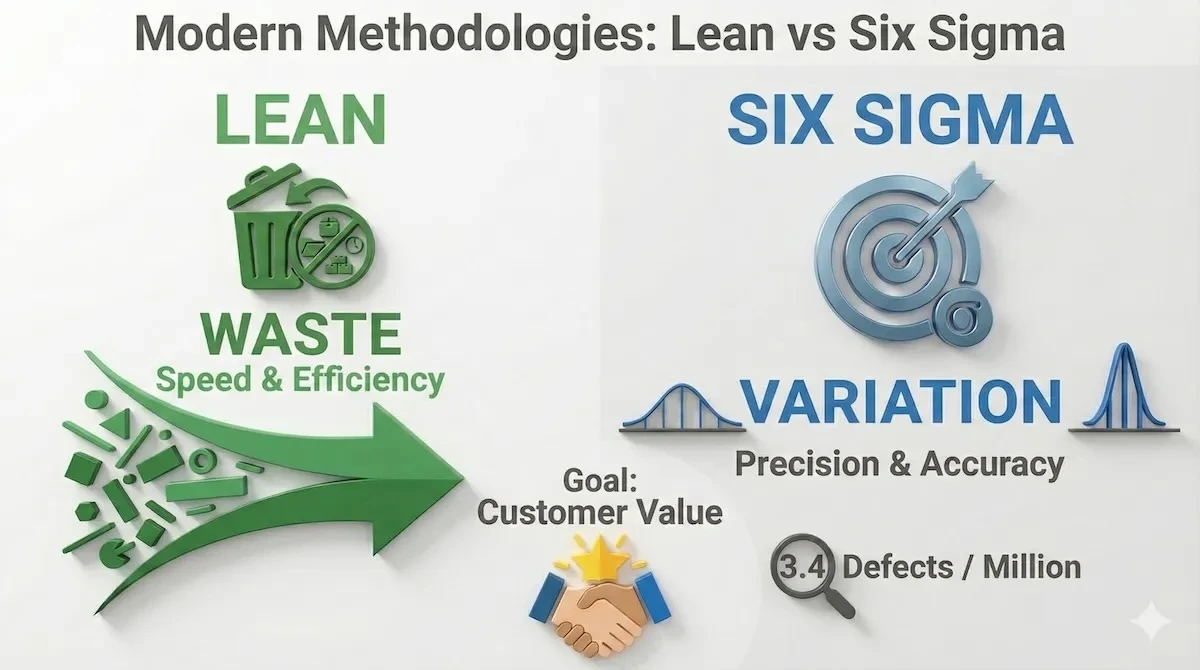
While Lean focuses on removing waste to increase speed, Six Sigma aims to reduce variation to ensure perfection.
Whether you focus on speed (Lean) or precision (Six Sigma), mastering both approaches will make you a versatile problem solver.
These are not just academic theories; they are highly sought-after professional certifications. Understanding them gives you a massive advantage in the job market. However, their complexity often requires expert guidance. A Quality control tutor online can be an invaluable resource, providing insights from an industry perspective that you might not get in a standard lecture.
Navigating the Challenges of Studying Quality Control
Let’s be honest. This subject is tough. It’s a unique blend of high-level statistics, management theory, and practical engineering. Students often struggle because:
- The Math is Abstract: It can be hard to connect statistical formulas to a real-world factory floor.
- The Concepts are Interlinked: Understanding one tool often requires knowledge of three others.
- The Application is Key: You can’t just memorize definitions; you have to know how to apply the concepts to solve problems.
This is where the right support system becomes crucial. Trying to untangle these complex ideas alone can be frustrating and time-consuming. It’s like trying to build that robot without an instruction manual.
Finding the Right Support: The Role of Effective Teaching
So, how do you go from being confused by control charts to confidently solving complex quality problems? The answer lies in effective guidance. While university professors provide a great foundation, the class size and pace can leave many students behind.
This has led many students and parents to Hire a Quality control tutor. One-on-one support allows you to learn at your own pace, ask the questions you might be embarrassed to ask in class, and focus on the specific areas where you’re struggling. It’s personalized education at its best.
The Power of Online Tutoring
In today’s connected world, your location doesn’t limit your access to expertise. Whether you’re a student in a top US university, a college in the UK, or a high school in the Gulf, Quality control tutoring online bridges the gap. You can connect with world-class experts who have real-world industry experience.
Imagine this: you’re working on a case study about supply chain logistics. Instead of just reading a textbook, you could be talking to a Quality control tutor online who has actually managed a supply chain for a major company. They can provide insights and practical advice that bring the subject to life. This is the kind of deep, practical learning that builds careers.
Conclusion: Building a Foundation for Excellence
That wobbly robot from my college days taught me that quality isn’t just a final check; it’s a mindset. It’s a commitment to excellence that is valued in every single profession. Studying quality control is challenging, but it’s an investment in your future. It equips you with a powerful toolkit for problem-solving, critical thinking, and continuous improvement.
Whether you’re aiming to be an engineer, a software developer, a manager, or an entrepreneur, these skills will set you apart. So, embrace the challenge, dig into the details, and never be afraid to ask for help along the way. With the right support, you can master the principles of quality and build a career that is not just successful, but truly excellent.
Frequently Asked Questions (FAQs)
Q1 What is the main goal of quality control?
The main goal is to identify and correct defects in a finished product or service before it reaches the customer.
Q2 Is quality control only for manufacturing?
No, its principles are applied in virtually every industry, including software, healthcare, finance, and customer service.
Q3 What math is needed for quality control?
A strong foundation in statistics and probability is essential for understanding concepts like SPC and sampling.
Q4 Can I get help with just one quality control assignment?
Yes, many tutoring services offer targeted help for specific homework, assignments, or exam preparation.
Q5 Is online tutoring for quality control effective?
It can be highly effective as it provides flexible, one-on-one access to global experts from the comfort of your home.
Q6 Why is quality control important for a career?
It provides you with valuable and transferable skills in data analysis, problem-solving, and process improvement.
Related Subjects
Control Charts
Lean Manufacturing
Six Sigma
Statistical Process Control (SPC)
Total Quality Management (TQM)
******************************
This article provides general educational guidance only. It is NOT official exam policy, professional academic advice, or guaranteed results. Always verify information with your school, official exam boards (College Board, Cambridge, IB), or qualified professionals before making decisions. Read Full Policies & Disclaimer , Contact Us To Report An Error
